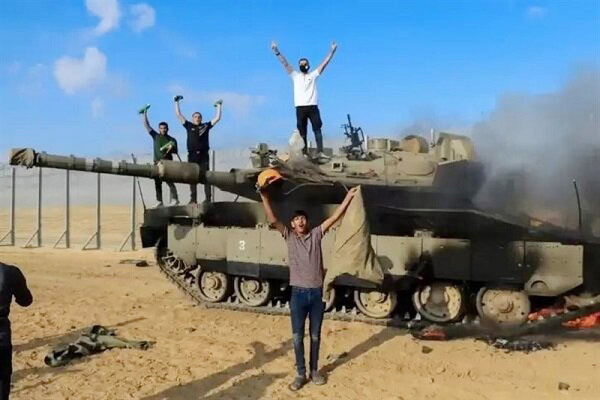ISRAEL HAS intensified its military presence around Rafah, deploying additional troops and destroying agricultural land in the district’s eastern areas.
This escalation comes amid heightened fears of a full-scale incursion into the area, which is already home to more than 1.7 million displaced Palestinians.
The situation has been further aggravated by the United States exercising its veto power at the United Nations Security Council late Thursday night to block Palestine’s widely supported bid for full UN membership.
Palestinian Authority President Mahmoud Abbas has vehemently criticised the US veto as ‘blatant aggression … which pushes the region ever further to the edge of the abyss’. This sentiment is echoed by Hamas, which condemned the US’s ‘biassed’ position ‘in the strongest terms’. The veto is seen as a part of a series of actions by the US that align closely with Israeli interests, to the detriment of Palestinian statehood aspirations.
Additionally, Egypt and Russia, along with other international powers, have expressed deep regret and frustration over the US’s failure to uphold its ‘legal and historical responsibility’ in promoting peace and justice in the region.
In response to the crisis, the foreign ministers of the Group of Seven (G7) bloc, which includes Canada, France, Germany, Italy, Japan, the United Kingdom, the United States, and the European Union, issued a joint statement following their meeting on the Italian island of Capri.
The statement expressed a clear opposition to any full-scale military operations in Rafah and called for the release of Israeli captives alongside a sustainable ceasefire in Gaza.
The G7 emphasised the need for a ‘credible and actionable plan to protect the civilian population’ in the region.
Simultaneously, the US has faced severe criticism for proposed arms deals that would provide Israel with significant military resources, including $700 million worth of tank ammunition, $500 million in tactical vehicles, and under $100 million in mortar rounds.
These proposals have been revealed alongside a separate bill by House Republicans proposing an additional $26 billion in military aid to Israel. This surge in military support comes despite growing concerns over Israel’s conduct in the war and its severe humanitarian impact on Gaza.
US Secretary of State Antony Blinken has been specifically targeted for his inaction regarding recommendations from a special panel within his department, the Israel Leahy Vetting Forum.
This committee, which includes experts on West Asia and human rights, suggested in December that Blinken disqualify Israeli military and police units from receiving US aid due to their involvement in human rights violations, including extrajudicial killings and abuses against Palestinians.
Despite these recommendations, there has been no move to halt the assistance, which critics argue contributes to a culture of impunity within Israeli forces.
The ongoing conflict has led to the deaths of at least 33,970 Palestinians, mostly women and children, and injured 76,770 others.
Since then, the US has expedited arms shipments to Israel, continuing to veto UN Security Council resolutions calling for an immediate ceasefire.
Reports from human rights organisations, including eyewitness accounts and video evidence, have documented widespread Israeli war crimes in Gaza.
